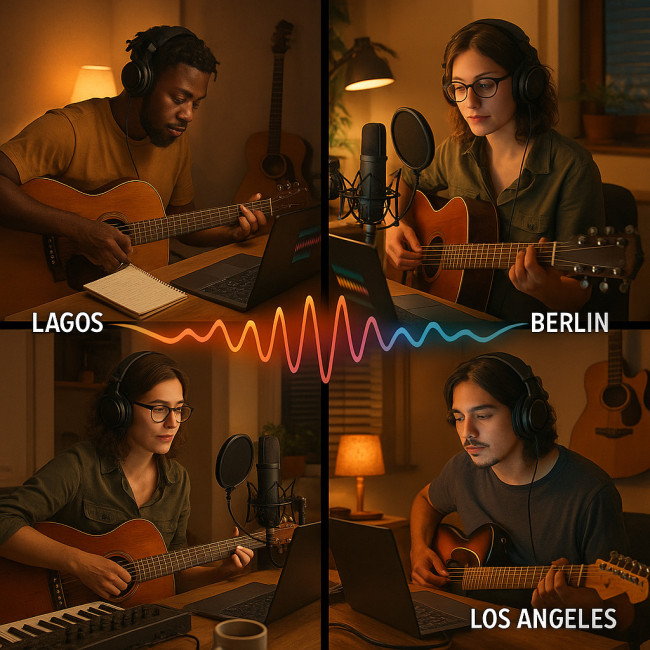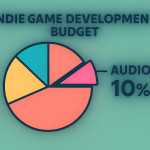Collaborative songwriting online: platforms, etiquette and revenue split models
Writing songs with partners you have never met in person is no longer a futuristic idea—it is a daily reality for thousands of creators. This guide explains how to pick the best online platforms, behave like a pro in virtual sessions, and choose fair revenue-split models so every collaborator gets paid without drama.
Why online collaboration is reshaping songwriting

Remote writing rooms remove geography from the creative process. A topliner in Lagos can team up with a beat-maker in Berlin and a lyricist in Los Angeles—all before breakfast. Thanks to near-zero-latency audio plug-ins, HD video chat and cloud DAW sessions, the creative flow now mirrors an in-person jam: riffs bounce back in seconds, not hours. Over the past decade, built-in translation chatbots and automatic stem versioning have lowered language and tech barriers for newcomers, letting artists focus on ideas rather than admin. Beyond convenience, online collaboration offers:
- Speed: shared cloud projects mean instant feedback loops.
- Diversity: cross-cultural input sparks fresh melodic and lyrical ideas.
- Lower costs: no studio rental or travel fees, keeping budgets lean.
- Networking leverage: published credits on global releases boost individual reputations and day rates. Learn more about pricing your contribution in this guide on musician day rates.
Comparing leading collaborative songwriting platforms
Not all platforms suit every genre or workflow. The table below summarises fees, file-sharing features and typical user profiles.
| Platform | Core Strength | Built-in Split Sheet Tool | Platform Fees | Best For |
|---|---|---|---|---|
| BandLab | Free DAW in the browser | No | 0 % | Beginners & demo writers |
| SoundBetter | Marketplace + vetted pros | Yes | 5 % escrow | Commercial projects |
| Splice | Sample cloud & versioning | No | Monthly sub | Producers trading stems |
| Kompoz | Public collab rooms | Yes | Free / $5 mo premium | Genre-diverse hobbyists |
| Topline (PRS) | Mobile voice memo sync | Yes | 0 % | Lyricists on the go |
Etiquette that keeps remote sessions productive
1. Agree on roles before pressing record
Outline who handles lyrics, melody, harmony, production and final mix. Clear scope avoids duplicated work and credit disputes later.
2. Communicate on one channel
Use a single thread in Slack, Discord or the platform's native chat. Jumping between apps increases the risk of lost files or version confusion.
3. Timestamp feedback
Quoting the exact bar or seconds mark (“Love the harmony at 1:14”) saves time and shows respect for everyone's schedule.
4. Update the split sheet immediately
Each time a structural change happens—new verse, altered hook—log percentage adjustments in real time. Platforms like SoundBetter make this painless; on others, use a shared Google Sheet.
5. Keep response times realistic
Even if inspiration strikes at 3 a.m., set expectations about response windows. A 24-hour reply rule keeps momentum without burning anyone out.
Common revenue split models
Choosing a split model early prevents heated debates when the song gains traction on playlists or lands sync deals. Below are the three most used approaches.
Equal ownership split
Every credited writer receives the same percentage, no matter actual contribution weight. This model nurtures team spirit on passion projects but may deter high-profile collaborators who invest more time.
Pro-rata by contribution
Each element—lyrics, topline, beat, arrangement—gets a pre-agreed value. If the track sells, royalties pay out according to that matrix. Use this method when skills and effort vary widely.
Buyout + royalty kicker
One party pays a fixed fee to others in exchange for larger ownership. A smaller back-end slice (for example 5 %) ensures everyone still benefits if the song blows up. Great for hiring specialists via producer meetup networks.
Source : Songtrust
Legal must-knows before you hit “publish”
- Collective Management: Register the work with a PRO (PRS, BMI, ASCAP) under all writers' names.
- Metadata hygiene: ISRC and ISWC codes need correct writer percentages to avoid royalty black holes.
- Session agreements: For hired instrumentalists, use templates like those explained in session contract essentials.
Monetising the finished song
Beyond streaming revenue, look at:
- Sync licensing for ad, film and game placements.
- Sample packs—monetise unused stems on marketplaces.
- Patreon exclusives—offer alternate versions to superfans.
When pitching, reference thriving collaboration hubs like online musician collaboration jobs to showcase past team projects.
QUIZ: Test your collaboration IQ
FAQ
- Do I need a lawyer for small online collaborations?
- For bedroom-level releases, a written split sheet and PRO registration usually suffice. Hire a lawyer if a label advances money or sync deals surface.
- How can we avoid version conflicts?
- Use track locking or DAW cloud saves. Platforms like Splice auto-version stems so you can roll back any mistaken edits.
- What happens if one writer ghosts the project?
- Include a sunset clause: after X days of no response, remaining writers can proceed, and the absent member keeps their current percentage.
- Can I sell the same beat to multiple collaborators?
- Yes—if you license it non-exclusively. Clarify this up front to prevent exclusivity assumptions.
- Which PRO should we register with if we live in different countries?
- Each writer registers the work with their local PRO under the same ISWC code. The societies then exchange royalties internationally.
Next steps
Ready to start? Create a shared folder, draft a two-page collaboration brief, and invite writers whose strengths complement yours. If you need orchestration muscle, explore tips in this crowdsourced orchestra roadmap. Your next hit may be one DM away.
Action now: Pick a platform from the table, open your calendar, and schedule a 90-minute virtual session this week. Momentum is the best co-writer.











